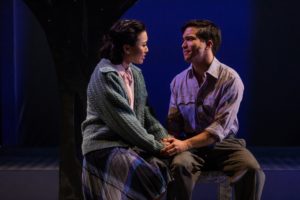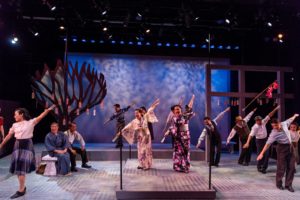
By Michele Markarian
‘Allegiance’ – Book by Marc Acito, Jay Kuo, and Lorenzo Thione, Music and Lyrics by Jay Kuo. Directed by Paul Daigneault. Presented by SpeakEasy Stage Company, Calderwood Pavilion at the Boston Center for the Arts, through June 2.
“Every Pearl Harbor Day, they trot me out to prove that I’m still alive”, says the elderly Sam Kimura (Gary Thomas Ng), a decorated World War II war hero. If Sam sounds bitter, it is because the bombing of Pearl Harbor produced a declaration of war against Japan that adversely affected loyal Japanese Americans, including Sam and his family. It was just a few months afterwards that the US government forcibly rounded up 110,000 Japanese American from California, Washington, Arizona and Oregon. Families, just by virtue of looking like the enemy, had to sell their homes, businesses and items for a pittance of what they were worth to take up residence in camps, interned behind barbed wire.
Sam has just learned that his older sister, Kei (the luminous Grace Yoo) has died. Although she had been like a mother to him, as his own mother died while giving birth, Sam and Kei have not spoken for fifty years. Most of “Allegiance” takes place in flashback, as Sam remembers events leading up to their conflict, and in doing so, becomes Sammy (Sam Tanabe), the younger version of himself.

Sammy, his father (touchingly played by Ron Domingo), Kei, and their grandfather (Gary Thomas Ng) all end up at Tule Lake, which is located not on a lake, but in a dry, desolate part of California. Life at the camp is harsh, with many rules as well as a curfew. Despite the presence of a nurse, Hannah Campbell (Melissa Geerlof) there is not enough medicine to truly aid the camp’s population. Anything remotely Japanese is forbidden. Punctuating all of this are announcements by Mike Masaoka (well played by Michael Hisamoto), the young National Secretary and Field Executive of the Japanese American Citizens League. Despite his best intentions to make things smoother between the Japanese and the US government, he is an object of derision and scorn for the camp residents, and prone to announcements such as “We leave our homes with smiling faces, grateful that we are wards of the government in this troubled time” and in an official statement regarding the prisoners, “They live in clean, pioneer communities”.
Conflict arises in the camp when the internees are asked to sign a loyalty pledge to the United States, renouncing any and all ties to Japan. On one side is Sammy, who wants to serve his country at all costs. On the other side is Frankie (the appealing Tyler Simahk) who refuses to pledge to a country that has treated him and his family so poorly. I won’t tell you which man I sympathized with more, but I will say this: Both of them, in their own way, were right.

“Allegiance” has a catchy score, particularly some of the 1940’s swing numbers, and is well sung by its excellent cast. Eric Levenson’s set is practical with clean lines, a pleasure to look at as well as very functional. Based on the childhood of actor George Takei, who was interned with his family, “Allegiance” has moments of deep feeling and despair, which made this reviewer a little weepy at times. Luckily, it is a musical that, despite its characters’ struggles, has a heartwarming ending. For tickets and information, go to: http://www.speakeasystage.com/

